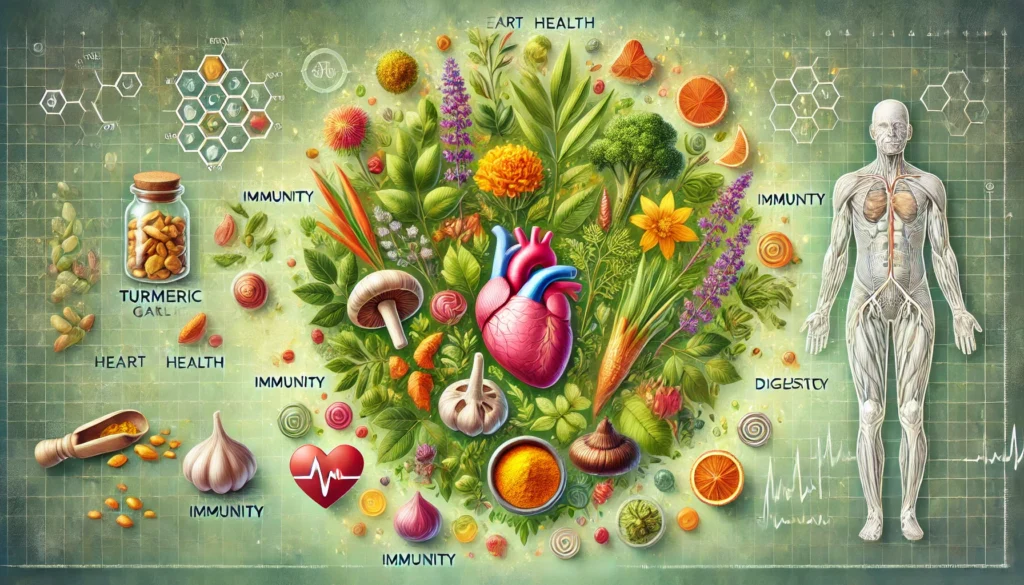Table of Contents
Pomegranate: Ancient Symbol and Modern Superfood for Optimal Health
The pomegranate, often referred to as a “superfood,” has been revered for thousands of years for both its symbolic and medicinal properties. With a vibrant red hue and a unique, jewel-like interior filled with juicy seeds (called arils), the pomegranate is much more than a beautiful fruit. It is packed with nutrients and antioxidants that have been shown to support heart health, reduce inflammation, and even aid in cancer prevention.
In this comprehensive guide, we will delve into the historical and cultural significance of the pomegranate, explore its botanical profile, examine its rich nutritional and phytochemical makeup, and detail its impressive health benefits. By the end of this article, you’ll understand why this ancient fruit has stood the test of time as a potent symbol of life, fertility, and vitality — and why it remains a staple in modern health and wellness practices.
This site contains affiliate links, and I may receive a commission on purchases made through them. Please see our Affiliate Disclosure for more details.

Historical Significance
Ancient Symbolism and Use
The pomegranate (Punica granatum) has been cultivated for over 4,000 years, originating in ancient Persia (modern-day Iran) and spreading to regions such as the Mediterranean, India, and Southeast Asia. It has long been celebrated as a symbol of fertility, prosperity, and abundance. In ancient Persia, pomegranates were associated with life and fertility due to their numerous seeds, and they became a symbol of wealth and royalty.
In ancient Egypt, pomegranates were placed in tombs as offerings to the dead, symbolizing the hope for rebirth and eternal life. Pharaohs were often depicted with pomegranates, and the fruit’s juice was believed to have rejuvenating properties. The pomegranate was also used in the preparation of medicines and perfumes.
Biblical and Mythological References
Pomegranates hold significant meaning in both biblical and mythological texts. In the Bible, the pomegranate is mentioned as one of the seven species of fruits found in the Promised Land, symbolizing righteousness and eternal life. In Deuteronomy 8:8, the pomegranate is listed as a bountiful fruit, along with wheat, barley, grapes, figs, and olives.
Pomegranates are also a prominent symbol in Greek mythology. The fruit played a central role in the myth of Persephone, the daughter of the goddess Demeter. According to the myth, Persephone was abducted by Hades, the god of the underworld, and while there, she ate six pomegranate seeds. This act bound her to spend six months each year in the underworld, resulting in the changing seasons — winter and autumn when she is away from her mother, and spring and summer when she returns to the earth.
In many cultures, pomegranates were believed to promote fertility and were used in wedding ceremonies to bless couples with a fruitful marriage. Even today, pomegranates remain a symbol of abundance, and the fruit is commonly used during celebrations and festivals in many parts of the world.
Pomegranate in Traditional Medicine
Throughout history, pomegranates have been used in various traditional medicine systems, particularly in Ayurvedic medicine and Traditional Chinese Medicine (TCM). In Ayurveda, pomegranate is considered a cooling fruit that helps balance Pitta dosha (the fire element), making it effective for soothing inflammation and digestive issues. Pomegranate juice is often used to treat diarrhea, improve digestion, and promote liver health.
In TCM, pomegranates are valued for their ability to nourish the blood, strengthen the heart, and improve digestion. The fruit is also used to treat sore throats, mouth sores, and respiratory conditions due to its astringent properties. Traditional healers also recognized the pomegranate’s high antioxidant content, which supports overall health and longevity.

Botanical Profile
Plant Overview
The pomegranate plant, Punica granatum, is a deciduous shrub or small tree that typically grows between 12 and 20 feet tall. Native to the Middle East and South Asia, it has since spread to various parts of the world with temperate climates, including the Mediterranean, Northern Africa, and California. The plant has dark green, glossy leaves and produces showy, funnel-shaped flowers that range from bright red to orange.
The pomegranate fruit itself is large, round, and has a tough outer skin that ranges in color from deep red to yellow-orange. Inside, the fruit is filled with compartments of juicy arils, each encasing a small, edible seed. These arils are the edible part of the pomegranate and are known for their sweet, tangy flavor and vibrant color.
Growing Conditions
Pomegranates thrive in warm, dry climates with well-drained soil. The plant is highly drought-tolerant and prefers full sunlight, making it ideal for Mediterranean and Middle Eastern regions, as well as parts of North America such as California and Arizona. Pomegranate trees can be grown from seeds or cuttings and typically begin to bear fruit after two to three years.
Once mature, the pomegranate tree produces fruit in late summer and fall, and the fruit can be harvested between September and February, depending on the region. Pomegranates do well in arid conditions, and their thick, leathery skin helps protect the fruit from dehydration.
Pomegranate Fruit Structure
One of the most fascinating aspects of the pomegranate is its complex structure. The fruit is divided into chambers by thin, white membranes, with each chamber housing clusters of arils (juice-filled sacs). These arils are surrounded by a tough, leathery skin that is inedible, though the arils themselves are packed with nutrients.
Pomegranate seeds, which are encased within the arils, are also edible and contain beneficial oils, fiber, and additional antioxidants. The unique structure of the pomegranate makes it one of the most nutrient-dense fruits available, with a high concentration of vitamins, minerals, and phytochemicals.

Nutritional and Phytochemical Profile
Pomegranates are celebrated for their impressive nutritional content and their ability to support overall health. Whether consumed as fresh arils, juice, or extract, the fruit is packed with vitamins, minerals, and potent phytochemicals that offer numerous health benefits.
Nutritional Content
A single pomegranate provides a significant amount of vitamins and minerals, including:
- Vitamin C: Pomegranates are an excellent source of vitamin C, a powerful antioxidant that supports the immune system, promotes skin health, and helps protect cells from oxidative damage.
- Vitamin K: Important for blood clotting and bone health, vitamin K is another key nutrient found in pomegranates.
- Folate (Vitamin B9): Essential for DNA synthesis and cell growth, folate plays a critical role in pregnancy and overall health.
- Potassium: A vital mineral that helps regulate blood pressure, potassium supports cardiovascular health and fluid balance in the body.
- Fiber: The seeds and arils of the pomegranate are rich in fiber, which aids digestion, supports gut health, and helps regulate blood sugar levels.
Phytochemicals
Pomegranates are especially rich in phytochemicals, compounds that offer a wide range of health benefits:
- Punicalagins: These powerful antioxidants are found in the pomegranate’s juice and peel. They help reduce inflammation, lower oxidative stress, and promote heart health.
- Ellagic Acid: Another potent antioxidant, ellagic acid is known for its anti-inflammatory and cancer-fighting properties.
- Anthocyanins: Responsible for the deep red color of pomegranate arils, anthocyanins have been shown to support heart health, protect the brain, and reduce the risk of chronic diseases.
Other Beneficial Compounds
In addition to punicalagins and ellagic acid, pomegranates contain a variety of other beneficial compounds, including tannins, flavonoids, and polyphenols. These compounds work synergistically to protect the body from oxidative damage, fight inflammation, and promote overall well-being.


Health Benefits of Pomegranate
Pomegranates offer an impressive array of health benefits, making them a valuable addition to any diet. Here are some of the key health benefits of consuming pomegranates regularly:
Rich in Antioxidants
Pomegranates are one of the richest sources of antioxidants, which help neutralize harmful free radicals in the body. Free radicals are unstable molecules that can cause cellular damage and contribute to chronic diseases like cancer, heart disease, and neurodegenerative conditions. The high concentration of antioxidants in pomegranate, particularly punicalagins and ellagic acid, helps protect cells from oxidative stress and inflammation.
Studies have shown that drinking pomegranate juice can significantly reduce markers of oxidative stress, improve antioxidant activity, and protect the body from free radical damage.
Supports Heart Health
Pomegranate is known for its heart-protective effects. The antioxidants in pomegranate, particularly punicalagins, help lower LDL (bad) cholesterol, reduce blood pressure, and improve overall cardiovascular function. Pomegranate juice has been shown to improve blood flow to the heart and reduce the risk of atherosclerosis, a condition characterized by the buildup of plaque in the arteries.
In one study, participants who drank pomegranate juice daily for three months experienced a significant reduction in blood pressure and improved cholesterol levels. Regular consumption of pomegranate has also been linked to a lower risk of heart attacks and strokes.
Anti-inflammatory Properties
Chronic inflammation is a major contributor to many diseases, including heart disease, arthritis, and cancer. The antioxidants in pomegranates help reduce inflammation by inhibiting the activity of pro-inflammatory enzymes and cytokines. Punicalagins and ellagic acid, in particular, have powerful anti-inflammatory effects.
Pomegranate has been shown to reduce inflammation in conditions such as **
osteoarthritis**, *rheumatoid arthritis*, and *inflammatory bowel disease (IBD)*.
Cancer-Fighting Potential
Emerging research suggests that pomegranate may have cancer-fighting properties, particularly in breast, prostate, and colon cancers. The antioxidants and polyphenols in pomegranate can help inhibit the growth of cancer cells and promote apoptosis (programmed cell death) in cancerous cells.
Studies have shown that pomegranate extract can reduce the proliferation of cancer cells and slow the progression of tumors. While more research is needed, the initial findings are promising and suggest that pomegranate could play a role in cancer prevention and treatment.
Boosts Digestive Health
Pomegranate is an excellent source of dietary fiber, which supports healthy digestion and promotes regular bowel movements. The fiber in pomegranate seeds helps prevent constipation and supports gut health by feeding beneficial bacteria in the gut microbiome. Pomegranate juice has also been shown to have prebiotic effects, promoting the growth of beneficial bacteria and improving overall digestive health.
Pomegranate’s antioxidant and anti-inflammatory properties can also help reduce symptoms of digestive disorders such as irritable bowel syndrome (IBS) and inflammatory bowel disease (IBD).
Improves Skin Health
Pomegranates are often used in skincare products due to their ability to promote healthy, youthful skin. The high levels of antioxidants in pomegranate help protect the skin from damage caused by UV rays, pollution, and free radicals, which can accelerate the aging process. Pomegranate also helps stimulate collagen production, improve skin elasticity, and reduce the appearance of fine lines and wrinkles.
Pomegranate oil, which is extracted from the seeds, is particularly effective for moisturizing the skin, reducing inflammation, and healing wounds.
Supports Joint Health
Pomegranate’s anti-inflammatory effects can help reduce joint pain and stiffness, particularly for people with arthritis. Studies have shown that pomegranate extract can help inhibit enzymes that contribute to cartilage breakdown, reducing the progression of osteoarthritis. Additionally, the antioxidants in pomegranate help protect joints from oxidative stress and inflammation.
Boosts Immune System
The high vitamin C content in pomegranate makes it an excellent immune booster. Vitamin C plays a critical role in the production of white blood cells, which are essential for defending the body against infections. Pomegranates also contain antimicrobial compounds that help fight off bacteria, viruses, and fungi.
Drinking pomegranate juice or eating fresh pomegranate seeds during cold and flu season can help strengthen the immune system and reduce the risk of illness.
Enhances Memory and Brain Function
Research suggests that pomegranate may have neuroprotective effects, helping to improve memory and cognitive function. The antioxidants in pomegranate help reduce oxidative stress and inflammation in the brain, which are key contributors to neurodegenerative diseases like Alzheimer’s and Parkinson’s disease.
In one study, participants who drank pomegranate juice showed improved verbal memory and cognitive performance compared to those who did not consume the juice. Pomegranate’s ability to improve blood flow to the brain may also enhance cognitive function and reduce the risk of age-related cognitive decline.
Supports Weight Management
Pomegranates are relatively low in calories but high in fiber, making them a great addition to a weight-loss or weight-management plan. The fiber in pomegranate seeds helps promote feelings of fullness and reduces appetite, making it easier to maintain a healthy weight. Additionally, the antioxidants in pomegranate help support metabolism and reduce inflammation, which can aid in weight loss.

Methods of Consumption
Pomegranates can be enjoyed in a variety of ways, from fresh arils to juice and supplements. Here are some of the most popular methods of consuming pomegranate for maximum health benefits:
Pomegranate Juice
Fresh pomegranate juice is one of the most popular ways to enjoy the fruit’s health benefits. The juice is rich in antioxidants and offers a concentrated source of vitamins and minerals. Drinking a glass of pomegranate juice daily can support heart health, reduce inflammation, and boost the immune system. Be sure to choose pure pomegranate juice without added sugars for the best health benefits.
Pomegranate Seeds (Arils)
Pomegranate seeds, or arils, are the edible part of the fruit and can be eaten as a snack or added to salads, yogurt, oatmeal, and smoothies. The arils provide a sweet-tart flavor and a satisfying crunch, along with a healthy dose of fiber, vitamins, and antioxidants. Arils can be eaten fresh or frozen for later use.
Pomegranate Supplements
Pomegranate extract supplements are available in capsule or powder form and offer a convenient way to enjoy the health benefits of pomegranate without having to consume the whole fruit. Pomegranate supplements are often used to support heart health, skin health, and inflammation. Be sure to choose high-quality supplements from reputable brands to ensure potency and purity.
Pomegranate Oil
Pomegranate oil, extracted from the seeds, is commonly used in skincare products due to its moisturizing and anti-inflammatory properties. The oil can be applied topically to promote healthy skin, reduce inflammation, and accelerate wound healing. Pomegranate oil is also available in supplement form for internal use, offering anti-inflammatory and antioxidant benefits.

Cautionary Advice
While pomegranates offer numerous health benefits, there are a few things to keep in mind when consuming pomegranate products:
Potential Side Effects
Pomegranate is generally safe for most people, but some individuals may experience digestive upset or allergic reactions, particularly if they consume large amounts of pomegranate juice or supplements. If you experience symptoms such as nausea, diarrhea, or skin irritation, reduce your intake and consult a healthcare provider.
Medication Interactions
Pomegranate may interact with certain medications, particularly blood pressure and cholesterol-lowering drugs. If you are taking medications for these conditions, consult your healthcare provider before consuming pomegranate juice or supplements, as it may affect the way your body metabolizes the drugs.
Safe Dosage
While pomegranate is safe to consume in moderate amounts, excessive intake of pomegranate juice or supplements may lead to digestive upset or interfere with medication. A recommended daily serving is one cup of pomegranate arils or 8 ounces of pomegranate juice. For supplements, follow the manufacturer’s instructions or consult a healthcare provider for personalized dosage recommendations.
Pregnancy and Nursing
Pomegranate is generally safe for pregnant and nursing women when consumed as part of a balanced diet. However, it’s always a good idea to consult with a healthcare provider before using pomegranate supplements during pregnancy or breastfeeding.

Conclusion
Pomegranates are a nutritional powerhouse with a long history of use in traditional medicine and a prominent place in various cultural and religious traditions. From supporting heart health and reducing inflammation to promoting skin health and protecting against cancer, pomegranates offer a wide range of health benefits that make them a valuable addition to any diet.
Whether you enjoy pomegranate juice, snack on fresh seeds, or use pomegranate oil in your skincare routine, this versatile fruit can enhance your health and wellness in numerous ways. As with any natural remedy, it’s important to consume pomegranate responsibly and consult with a healthcare provider if you have any underlying health conditions or are taking medications.
With its rich history, impressive nutritional profile, and proven health benefits, pomegranate truly deserves its status as a superfood. Incorporate this ancient fruit into your daily life and experience the myriad ways it can support your health and vitality.







